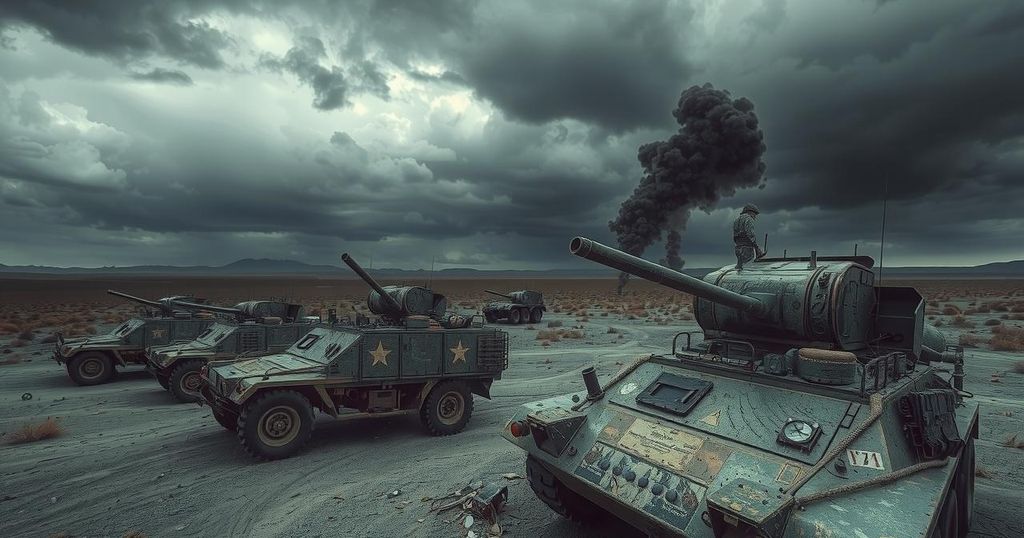Conflicts
AFRICA, ASIA, BURHAN, CIVIL WAR, CONFLICT RESOLUTION, EGYPT, EUROPE, HEM, HEMEDTI, HORN OF AFRICA, HUMANITARIAN ISSUES, INTERNATIONAL CONFERENCE, IRAN, IRAQ, MOHAMED HAMDAN DAGALO, NORTH AMERICA, RAPID SUPPORT FORCES, RED SEA, REFUGEE CRISIS, RSF, SA, SAF, SUDAN, SUDAN CIVIL WAR, SUDANESE ARMED FORCES, UAE, UKRAINE, UNITED ARAB EMIRATES, UNITED STATES
Nia Simpson
Sudan’s Civil War: A Geopolitical Disaster Unfolds
Sudan’s civil war, ignited on April 15, 2023, has devolved into a humanitarian crisis involving deep-rooted military power struggles. External support from powers like Egypt and the UAE complicates the conflict. Estimates report around 150,000 deaths and millions displaced. The international community’s response has been limited, necessitating collaborative diplomacy to seek resolution and restore stability.
Sudan is currently embroiled in a devastating civil war, which has escalated into one of the worst humanitarian crises in recent history. This conflict, ignited on April 15, 2023, arises from a power struggle between two military factions: the Sudanese Armed Forces (SAF), led by General Abdel Fattah al-Burhan, and the Rapid Support Forces (RSF), commanded by Lt. Gen. Mohamed Hamdan Dagalo, also known as Hemedti.
The conflict in Sudan extends beyond its borders, becoming a proxy arena for regional powers such as Egypt and the United Arab Emirates (UAE), each supporting their preferred factions. Egypt backs the SAF, considering it vital for stability due to shared borders and refugee crises, while the UAE favors the RSF, motivated by strategic interests related to gold and land acquisitions in Sudan.
Military resources have been supplied to both factions, with the SAF receiving support from Egypt and Iran, while the RSF has relied on the UAE. This external intervention exacerbates the humanitarian implications, with reports estimating up to 150,000 deaths and over 11 million displaced, including three million fleeing across borders.
The global community has largely overlooked Sudan amid competing international priorities, as its situation lacks the geopolitical significance of other conflicts like Ukraine or Iraq. The United States has notably reduced its involvement, previously focusing on sanctions against both factions for human rights violations but failing to initiate effective ceasefire negotiations.
A prospect for peace may emerge through the potential involvement of former President Donald Trump. His unique relationships with key Arab leaders may afford him leverage to mediate where traditional diplomacy encounters difficulties. His past efforts to normalize relations between Sudan and Israel under the Abraham Accords showcase his capabilities in navigating complex regional scenarios.
The conflicting interests of Egypt and the UAE in supporting separate factions complicate the situation. Egypt views the SAF as central to stability, especially with over 1.2 million Sudanese refugees currently located within its borders. The UAE seeks to harness Sudan’s resources strategically, although the ongoing conflict has thwarted pivotal agreements like the Abu Amama port deal.
Egypt could assume a mediating role to reconcile the UAE’s strategic ambitions with Sudanese needs, particularly if stabilization provides mutual benefits. The UAE’s so-called neutrality faces scrutiny in the U.S. government, where officials accuse it of complicity in violence against civilians through its support of the RSF.
Achieving a peaceful resolution will require meaningful dialogue among the regional stakeholders. Each party must identify the merits of diplomacy over persistent conflict for any hope of restoring peace in Sudan. The future remains precarious, hinging on international cooperation rather than rivalry.
This crisis highlights that Sudan’s turmoil is not merely a local issue but deeply intertwined with the broader geopolitical strategies of larger nations. The combination of military, economic, and regional interests not only shapes the ongoing conflict but will also determine the humanitarian outcome for millions caught in the strife. As the Biden administration manages domestic challenges, the urgent needs of the Sudanese population demand attention. It remains to be seen if leadership will emerge to address this humanitarian emergency effectively.
In summary, Sudan’s civil war represents a complex humanitarian crisis fueled by internal power struggles and external interference from regional powers. With significant loss of life and massive displacement, the international community’s muted response highlights the need for urgent action. Collaborative diplomatic efforts involving influential figures and regional stakeholders may present a pathway to restoring peace. The fragility of the situation underscores the necessity for focused global attention on Sudan’s humanitarian needs.
Original Source: evrimagaci.org








Post Comment